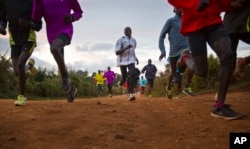The World Anti-Doping Agency has declared Kenya “non-compliant” with regulations prohibiting the use of performance enhancing drugs, jeopardizing the African nation's participation in the 2016 Rio Summer Olympics. The International Association of Athletics Federations said Friday that it won't ban Kenya, but the International Olympic Committee has the final word.
Kenya passed a law in April criminalizing the use of performance-enhancing drugs and creating a national anti-doping agency to tackle the problem.
The Summer Olympics are just three months away, and Kenya was trying to avoid a ban. But the World Anti-Doping Agency (WADA) declared Thursday that the new legislation is “not in line with” its code.
Kipchoge Keino, a member of Kenya’s International Olympic Committee, told VOA they will appeal.
“We are putting up an appeal requesting the World Anti-Doping to consider Kenya to participate. It’s very sad, around the world is that, we are begging for the youth of this country to participate in the Olympic," Keino said. " It’s a great loss for our youth if they don’t participate. Those people behind these things, [action should be] taken by the government of this country and also other countries of the world. We need clean athletes participating in the Olympics.”
Since 2011, more than 40 Kenyan athletes have failed drug tests. The International Association of Athletics Federations suspended 18 Kenyan athletes in January for doping.
Kenya’s runners typically dominate their events at international competitions.
Philip Ngwono runs the 100 and 200 meters. He has been training for selection on the 2016 Olympic team.
“It’s completely crazy because they know for a fact that not every athlete is doping," he said. "We’ve been performing all this time without performance-enhancing drugs. This is kind of a bullying tactic. Kenyans are being bullied because you know the guys who are using, who’ve been using banned substances. Why don’t you go after them and their managers? Why ban the entire Kenyan team? That’s absurd, you know, it’s ludicrous.”
Coach Peter Muciri was among the sports officials who contributed to the drafting of Kenya’s anti-doping bill.
“I think we did our level best and the recommendations were taken in, and what I don’t understand is what sections are they complaining were removed," he said.
For the ban to take effect, the International Olympic Committee must ratify the ruling of the WADA board.
Kenyan runners won 11 medals at the 2012 Summer Olympic games, the most medals of any African country that year.






